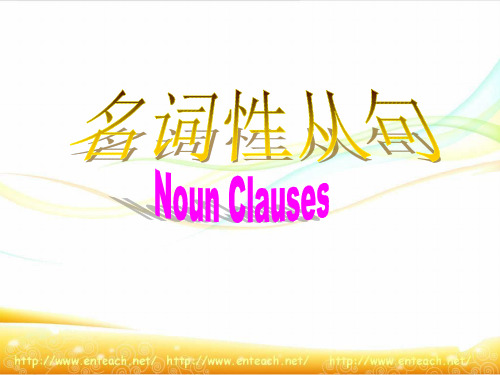高中英语语法——名词的用法 ppt课件
合集下载
高考必备语法动名词的用法课件 (共35张PPT)

• • • •
如: The railway is in the process of being constructed. 铁路在兴建中。 After having kept a prisoner in the Bastille for many years,Dr Manette had recently been set free. • 曼奈特医生被关在巴士底监狱许多年后,最近 获释。 • 特别提示:-ing形式的主动形式表示被动意义 • 在want,need,deserve,require 等动词后,总是用ing形式的主动形式表示被动意义,相当于“to be+过去分词”。
• • • • • • • •
1.作主语 动名词作主语时,句子有两种形式: (1)动名词直接置于句首主语的位置上。 Playing tricks on others is something we should never do. 捉弄别人是我们万万不能干的。 Learning new words is very imis easier than doing。说比做容易。
• (2)用形式主语it,把真正的主语——动名词结构 移置句尾。但这种句子形式有一定的限制,作 表语的只能是某些形容词或少数名词,如 useful,useless,good,fun,no use,worth等。例如: • It is useless trying to argue with Shylock. • 和夏洛克争辩是没有什么用的。 • It’s worth making the effort. • 这事值得去做。 • Is it any good trying to explain? • 想再解释一次有好处吗? • It is pleasant working with you. • 跟你在一起工作是令人愉快的。
高考英语语法完全讲解——名词性从句课件(共17张PPT)

三、what/whatever与
which/whichever的区别
what/whatever意为“什么/无论什么”,描述的事物在上下 文中没有范围;which/whichever意为“哪个/无论哪个”, 描述的事物在上下文中有范围。 To be honest, I can hardly understand what/whatever you have said. Here is the dress. This is what I have been dreaming of. Here are many beautiful dresses. You can choose whichever you like.
高考英语语法完全讲解 名词性从句
定义及分类
在句中起到名词所能充当的句子成分的从句称之 为名词性从句,名词常用来作主语、宾语、表语、 同位语,因此,对应的名词性从句可以分为四大 类:主语从句、宾语从句、表语从句、同位语从 句。
主句从句
1、作句子主语的从句叫作主语从句。 2、为避免句子头重脚轻,常用形式主语it代替主语从 句,把主语从句置于句尾。常用的句型有:It is/was+ 形容词/名词/过去分词+that从句。
表语从句
位于系动词之后作表语的从句叫表语从句。 The problem is who is to pay and when we can start.
同位语从句
同位语从句说明其前面名词的具体内容。通常由that引 导,常接同位语从句的名词有:news, conclusion, possibility, rumor, certainty, story, word, mystery, idea, doubt, hope, truth, question, belief, fact, message, evidence, information, explanation, rule, probability, question, wish, thought, statement, report, opinion, principle等。
英语语法基础-PPT

It is too difficult a test for us beginners.
He didn’t kown how great a mistake he had made. C)quite,rather与单数名词连用,冠词位于其后,但若 rather,quite前有形容词修饰,则不定冠词置于前后均可,如:
It was rather a disaster. He is rather an unplearant person.=He is a rather unpleasant person.
❖ 2,定冠词的位置
❖ 通常位于名词或名词修饰语之前,但若遇上 all,both,double,half,twice,three times等词的时候,定冠词置于其中。如:
consider one’s feelings make friends with 与某人交朋友 take measures to do sth 采取措施做某事 make repairs 修理 make matters better使情况好转
第二章冠词
❖ 分类:不定冠词,定冠词,零冠词 ❖ 冠词的位置: ❖ 1、不定冠词的位置A)若遇上such,what,many,half等词,不
❖ If I were her ,I would leave. ❖ 注:单独使用的人称代词通常用宾格。如:
❖ “I want to leave.” “Me too.”
❖ “Who did this?” “Me.” ❖ B)人称代词的排列顺序。对于单数人称代词,其排列通常为“二、三、一”
即you,he and me.而对于复数人称代词,则其排列通常为“一、二、三” 即we,you and they.如:
❖ i)用于某些习语
He didn’t kown how great a mistake he had made. C)quite,rather与单数名词连用,冠词位于其后,但若 rather,quite前有形容词修饰,则不定冠词置于前后均可,如:
It was rather a disaster. He is rather an unplearant person.=He is a rather unpleasant person.
❖ 2,定冠词的位置
❖ 通常位于名词或名词修饰语之前,但若遇上 all,both,double,half,twice,three times等词的时候,定冠词置于其中。如:
consider one’s feelings make friends with 与某人交朋友 take measures to do sth 采取措施做某事 make repairs 修理 make matters better使情况好转
第二章冠词
❖ 分类:不定冠词,定冠词,零冠词 ❖ 冠词的位置: ❖ 1、不定冠词的位置A)若遇上such,what,many,half等词,不
❖ If I were her ,I would leave. ❖ 注:单独使用的人称代词通常用宾格。如:
❖ “I want to leave.” “Me too.”
❖ “Who did this?” “Me.” ❖ B)人称代词的排列顺序。对于单数人称代词,其排列通常为“二、三、一”
即you,he and me.而对于复数人称代词,则其排列通常为“一、二、三” 即we,you and they.如:
❖ i)用于某些习语
Unit1语法知识名词短语形容词短语和副词短语课件高中英语人教版

系表
名词短语的功能
1.名词短语做主语
The cute girl that is wearing blue jeans is his sister
主语
系表
The suspicion that the cute girl is his sister is true.
主语
系表
名词短语的功能
The school adviser helped me choose the suitable ones. 2.名词短语做宾语
名词短语的构成
一个女孩
a girl
一个可爱的女孩
a cute girl
一个小个子的可爱女孩
a short cute girl
a cute short girl
注意:多个修饰词有特定的排序
“县官叔(序数词)叔(基数词)有一个美小圆旧黄的法国木书房”
名词短语的构成
那个穿蓝色牛仔裤的可爱女孩
the cute girl in blue jeans 介词短语做后置定语 the cute girl wearing blue jeans 分词短语做后置定语
Generally speaking,the more expensive the stereo , the better it is.
一般来说,立体声音响越贵越好。(作评注性状语,修饰整个句子)
去掉that 从句不完整 是定语从句
The cute girl that is wearing blue jeans is his sister
主语
系表
去掉that 从句完整 是同位语从句
The suspicion that the cute girl is his sister is true.
高中英语语法大全全课件非常详细(561张PPT)PPT课件

Two teas, please. 请来两杯茶。
d. 抽象名词有时也可数。
four freedoms 四大自由
the four modernizations 四个现代化
many interests 许多兴趣
精选PPT课件
15
精选PPT课件
16
问题1
The ______ is just around the corner and you won’t miss it. (01北京春季)
有些抽象名词和物质名词也可转化为可数名词,用
来表示某种特定的意义。a knowledge of …表示
“对……有所了解“。又如:
This meeting is a great success.
请看下面的可数与不可数名词的转化:Βιβλιοθήκη 精选PPT课件14
a. 当物质名词转化为个体名词时。
Cake is a kind of food. 蛋糕是一种食物。 (U)
A. a four hour C. a four-hours
B. a four hour's
✓D. a four hours'
精选PPT课件
18
问题3: There are only twelve _____ in the hospital.
✓ A.woman doctors B.women doctors
大多数不可数名词都不可能转化为可数名词,常
见的有:information; news; advice; progress;
fun ……如:
This is not a match. We’re playing chess for _____.
✓ A habit B hobby C fun D game (2001上海春季)
高中英语语法-名词性从句精讲(共73张PPT)

Whoever wants the book may have it. I’ll do whatever I can to help him. Buy whichever is cheapest.
连接副词 when, where, how, why
when • When they will start is unknown yet. where • Where she has gone is a mystery. how • How this happened is not clear. why • Why he did that wasn’t quite unclear.
主语从句关联词 连词 that, whether 连接代词 what, who, whom, which 连接副词 when, where, how, why
连词 that, whether
只起连接作用 在从句中不充当任何句子成分
• That he will win is certain.
• It has been reported that sales of beef in China will increase.
宾语从句关联词 连词 that, whether; if 连接代词 what, who, whom, whose, which 连接副词 when, where, how, why
• I doubt _______ he will come soon. • I do not doubt _____ he will come soon. • Do you doubt _____ he will come soon?
• what surprised me was what he said.
高中英语语法 非谓语动词 动名词的用法课件(共58张PPT)

2) I’ll remember to post the letter. 我会记着去寄信的。
3) I shall never forget seeing the famous writer. 我__永__远___不__会__忘__记__见__到__过__那__位__著__名__ 作__家__。_
4) Don’t forget to write to your mother. 不__要__忘__了__给__你__母__亲__写__信__。_
E. go on doing 和 go on to do go on doing 继续做一直在做的事; go on to do 接着做另一件事。如:
1) 请接着做这同一个练习。
P__le_a_s_e_g_o__o_n_d_o_i_n_g_ the same exercise. 2) 请做另外一个练习。 P_l_e_a_s_e_g_o_o_n__t_o_d_o_ the other exercise.
一般式 完成式
主动形式 doing
having done
被动形式 being done having been done
一. 作主语 动名词作主语时,句子有三种形式:
①动名词直接置于句首主语的位置上。 1) 捉弄别人是我们万万不能干的.
_P_la_y_i_n_g_t_r_i_ck__s_o_n_o_t_h_e_r_s_ is something we should never do. 2) 学习新单词对我来说非常重要。
_it_i_s_p_l_e_a_sa_n__t _w_o_r___w_i_t_h_y_o_u_._____
③ 在there be结构中作主语,这种结 构的意思相当于“It is impossible to do… ” 如:
3) I shall never forget seeing the famous writer. 我__永__远___不__会__忘__记__见__到__过__那__位__著__名__ 作__家__。_
4) Don’t forget to write to your mother. 不__要__忘__了__给__你__母__亲__写__信__。_
E. go on doing 和 go on to do go on doing 继续做一直在做的事; go on to do 接着做另一件事。如:
1) 请接着做这同一个练习。
P__le_a_s_e_g_o__o_n_d_o_i_n_g_ the same exercise. 2) 请做另外一个练习。 P_l_e_a_s_e_g_o_o_n__t_o_d_o_ the other exercise.
一般式 完成式
主动形式 doing
having done
被动形式 being done having been done
一. 作主语 动名词作主语时,句子有三种形式:
①动名词直接置于句首主语的位置上。 1) 捉弄别人是我们万万不能干的.
_P_la_y_i_n_g_t_r_i_ck__s_o_n_o_t_h_e_r_s_ is something we should never do. 2) 学习新单词对我来说非常重要。
_it_i_s_p_l_e_a_sa_n__t _w_o_r___w_i_t_h_y_o_u_._____
③ 在there be结构中作主语,这种结 构的意思相当于“It is impossible to do… ” 如:
高中英语语法-名词性从句课件

Went --go
• 3.It depends on if the weather is suitable for us to do it. If ---whether
He said something at the meeting. It shocked everybody.
What he said at the meeting shocked everybody.
Develop the paragraph:subject clause
Clearly, English is more and more important. Last Saturday we invited Professor Zhang to give us a report on how to learn English well. His report helps us a lot. Now many students spend one more hour in learning English.
表语从句
• 7.如果我有这么多钱,我会自己做买卖,那就是 我想做的事情
表语从句
• 7.如果我有这么多钱,我会自己做买卖,那就是 我想做的事情 • I’d like to start my own business –that’s what I’d do if I had the money
同位语从句
一.浙江高考卷
1.No one knows for sure when advertising first started. 2.Many historians believe that the first outdoor signs were used about five thousand years ago 3.I took what I could get-----a teaching job at what I considered a distant wild area 4.I wondered if he would let me finish out the day.
• 3.It depends on if the weather is suitable for us to do it. If ---whether
He said something at the meeting. It shocked everybody.
What he said at the meeting shocked everybody.
Develop the paragraph:subject clause
Clearly, English is more and more important. Last Saturday we invited Professor Zhang to give us a report on how to learn English well. His report helps us a lot. Now many students spend one more hour in learning English.
表语从句
• 7.如果我有这么多钱,我会自己做买卖,那就是 我想做的事情
表语从句
• 7.如果我有这么多钱,我会自己做买卖,那就是 我想做的事情 • I’d like to start my own business –that’s what I’d do if I had the money
同位语从句
一.浙江高考卷
1.No one knows for sure when advertising first started. 2.Many historians believe that the first outdoor signs were used about five thousand years ago 3.I took what I could get-----a teaching job at what I considered a distant wild area 4.I wondered if he would let me finish out the day.
- 1、下载文档前请自行甄别文档内容的完整性,平台不提供额外的编辑、内容补充、找答案等附加服务。
- 2、"仅部分预览"的文档,不可在线预览部分如存在完整性等问题,可反馈申请退款(可完整预览的文档不适用该条件!)。
- 3、如文档侵犯您的权益,请联系客服反馈,我们会尽快为您处理(人工客服工作时间:9:00-18:30)。
• 观众有形形色色的穿着。 The audience are dressed in a variety of ways.
• 物质名词
•
物质名词指不可分成个体的物质。下面是一
些常见的物质名词:
•
beer cheese cloth coal cotton jam
jelly juice meat medicine oil paint paper
• 敌人受到重大损失。 The enemy has suffered heavy losses.
• 敌军正在攻打该城。 The enemy were attacking the town.
• 观众自始至终欣赏这次演出。 The audience enjoys every minute of the performance.
• 在多数情况下,这种名词都用于单数形式, 并不加任何冠词:
• Knowledge is power. 知识就是力量。(谚)
二、常用不可数名词: 主要是物质名词和抽象名词
advice 忠告/主意 age 年龄
baggage 行李
beauty 美丽,漂亮 bread 面包 beer 啤酒
camping 露营 cloth 布 coffee 咖啡 courage 勇气
集体名词是由个体组成的集体的名称,下面 是一些常见的集体名词:
army audience committee community company crew enemy family flock gang government group herd media navy police public staff team
perfume plastics poison salad snow tea
whisky wine wood yoghurt
• *有些物质名词可用作可数名词,表示“一份”, “一杯”等:
A dozen beers,please. 请来一打啤酒
*有些物质名词可用作可数名词,表示“一种”: It was a special tea which tasted of orange blossoms. 这是一种特别的茶,有橘子花味。
He’s been here for a month.他在这里待一 星期了。 • 下面是一些常见的个体名词:
accident actor baby bank battle beach camp captain star station task teacher tent thought woman
集体名词
cream 奶油 damage 损害 death 死亡 dust 尘土
experience 经验 fear 担心
furniture 家具
glass 玻璃 gold 黄金 help 帮助 hope 希望
hair 头发 homework 作业 horror 恐惧 ice 冰
information 消息/信息 jam 果酱 juice 饮料
*专有名词(proper nouns) *普通名词(common nouns) 专有名词主要指人名、地名或某类人或事物的名称,如:
*人名:Diana,Einstein,Miss Brown,President Bush; *地名:Asia,Kensington Gardens,the Yellow River, *某些人的名称:Americans,Chinese,Japanese, *某些抽象事物的名称:Buddhism,Geneva Conference, *月份、周日及节日名词:June,Monday,Easter, *书名、电影及诗歌名:A Tale of Two Cities,
knowledge 知识 luggage 行李 mercy 仁慈
money 金钱 oil 油 paper 纸 pity 同情
其中个体名词和集体名词可以用数来数的,称为 可数名词(countable nouns);
物质名词和抽象名词是无法以数计的,称为 不可数名词(uncountable nouns)。
个体名词
个体名词指作为个体而存在的人或东西,可以 指具体东西,如:
She has three brothers.她有三个哥哥。 也可指抽象的东西,如:
(一)名词
对名词的考查通常在试题中占10%左右,主要 是名词的数的变化 (特别是不规则变化的名词复 数)、可数名词和不可数名词的区别以及名词所 有格的运用。在完型填空中常考察词义的分辨。
一、名词的分类 二、常用不可数名词 三、可数名词的复数形式和名词所有格 四、名词的构成
专有名词与普通名词
名词可分为两大类:
• 抽象名词
• 抽象名词主要指一些抽象概念的名称,它 们一般是不可数的,没有复数形式,前面也不 能加冠词a,an。下面是一些常见的抽象名词:
• anger beauty childhood comfort confidence courage experience failure faith fashion fear freedom fun growth respect safety silence truth violence waste wealth
Gone with the Wind,Ode to the West Wind(西风颂), *对家人的称呼:Mum,Dad,Auntie,Uncle Tom
专有名词开头的字母要大写。
普通名词可分为四类: *个体名词(individual nouns); *集体名词(collective nouns); *物质名词(mass nouns); *抽象名词(abstract nouns)。
这些词本身有复数 (注明者除外),带复数 动词,表示多个集体。
单数集体名词有时作单数看待,有时作复 数看待。一般说来,作为整体时作单数看待, 想到它包含的成员时作复数看待。
• 公众支持它的可能性不大。 The public was unlikely to support it.
• 公众受到报纸的蒙骗。 The public were deceived by the newspapers.
• 物质名词
•
物质名词指不可分成个体的物质。下面是一
些常见的物质名词:
•
beer cheese cloth coal cotton jam
jelly juice meat medicine oil paint paper
• 敌人受到重大损失。 The enemy has suffered heavy losses.
• 敌军正在攻打该城。 The enemy were attacking the town.
• 观众自始至终欣赏这次演出。 The audience enjoys every minute of the performance.
• 在多数情况下,这种名词都用于单数形式, 并不加任何冠词:
• Knowledge is power. 知识就是力量。(谚)
二、常用不可数名词: 主要是物质名词和抽象名词
advice 忠告/主意 age 年龄
baggage 行李
beauty 美丽,漂亮 bread 面包 beer 啤酒
camping 露营 cloth 布 coffee 咖啡 courage 勇气
集体名词是由个体组成的集体的名称,下面 是一些常见的集体名词:
army audience committee community company crew enemy family flock gang government group herd media navy police public staff team
perfume plastics poison salad snow tea
whisky wine wood yoghurt
• *有些物质名词可用作可数名词,表示“一份”, “一杯”等:
A dozen beers,please. 请来一打啤酒
*有些物质名词可用作可数名词,表示“一种”: It was a special tea which tasted of orange blossoms. 这是一种特别的茶,有橘子花味。
He’s been here for a month.他在这里待一 星期了。 • 下面是一些常见的个体名词:
accident actor baby bank battle beach camp captain star station task teacher tent thought woman
集体名词
cream 奶油 damage 损害 death 死亡 dust 尘土
experience 经验 fear 担心
furniture 家具
glass 玻璃 gold 黄金 help 帮助 hope 希望
hair 头发 homework 作业 horror 恐惧 ice 冰
information 消息/信息 jam 果酱 juice 饮料
*专有名词(proper nouns) *普通名词(common nouns) 专有名词主要指人名、地名或某类人或事物的名称,如:
*人名:Diana,Einstein,Miss Brown,President Bush; *地名:Asia,Kensington Gardens,the Yellow River, *某些人的名称:Americans,Chinese,Japanese, *某些抽象事物的名称:Buddhism,Geneva Conference, *月份、周日及节日名词:June,Monday,Easter, *书名、电影及诗歌名:A Tale of Two Cities,
knowledge 知识 luggage 行李 mercy 仁慈
money 金钱 oil 油 paper 纸 pity 同情
其中个体名词和集体名词可以用数来数的,称为 可数名词(countable nouns);
物质名词和抽象名词是无法以数计的,称为 不可数名词(uncountable nouns)。
个体名词
个体名词指作为个体而存在的人或东西,可以 指具体东西,如:
She has three brothers.她有三个哥哥。 也可指抽象的东西,如:
(一)名词
对名词的考查通常在试题中占10%左右,主要 是名词的数的变化 (特别是不规则变化的名词复 数)、可数名词和不可数名词的区别以及名词所 有格的运用。在完型填空中常考察词义的分辨。
一、名词的分类 二、常用不可数名词 三、可数名词的复数形式和名词所有格 四、名词的构成
专有名词与普通名词
名词可分为两大类:
• 抽象名词
• 抽象名词主要指一些抽象概念的名称,它 们一般是不可数的,没有复数形式,前面也不 能加冠词a,an。下面是一些常见的抽象名词:
• anger beauty childhood comfort confidence courage experience failure faith fashion fear freedom fun growth respect safety silence truth violence waste wealth
Gone with the Wind,Ode to the West Wind(西风颂), *对家人的称呼:Mum,Dad,Auntie,Uncle Tom
专有名词开头的字母要大写。
普通名词可分为四类: *个体名词(individual nouns); *集体名词(collective nouns); *物质名词(mass nouns); *抽象名词(abstract nouns)。
这些词本身有复数 (注明者除外),带复数 动词,表示多个集体。
单数集体名词有时作单数看待,有时作复 数看待。一般说来,作为整体时作单数看待, 想到它包含的成员时作复数看待。
• 公众支持它的可能性不大。 The public was unlikely to support it.
• 公众受到报纸的蒙骗。 The public were deceived by the newspapers.
